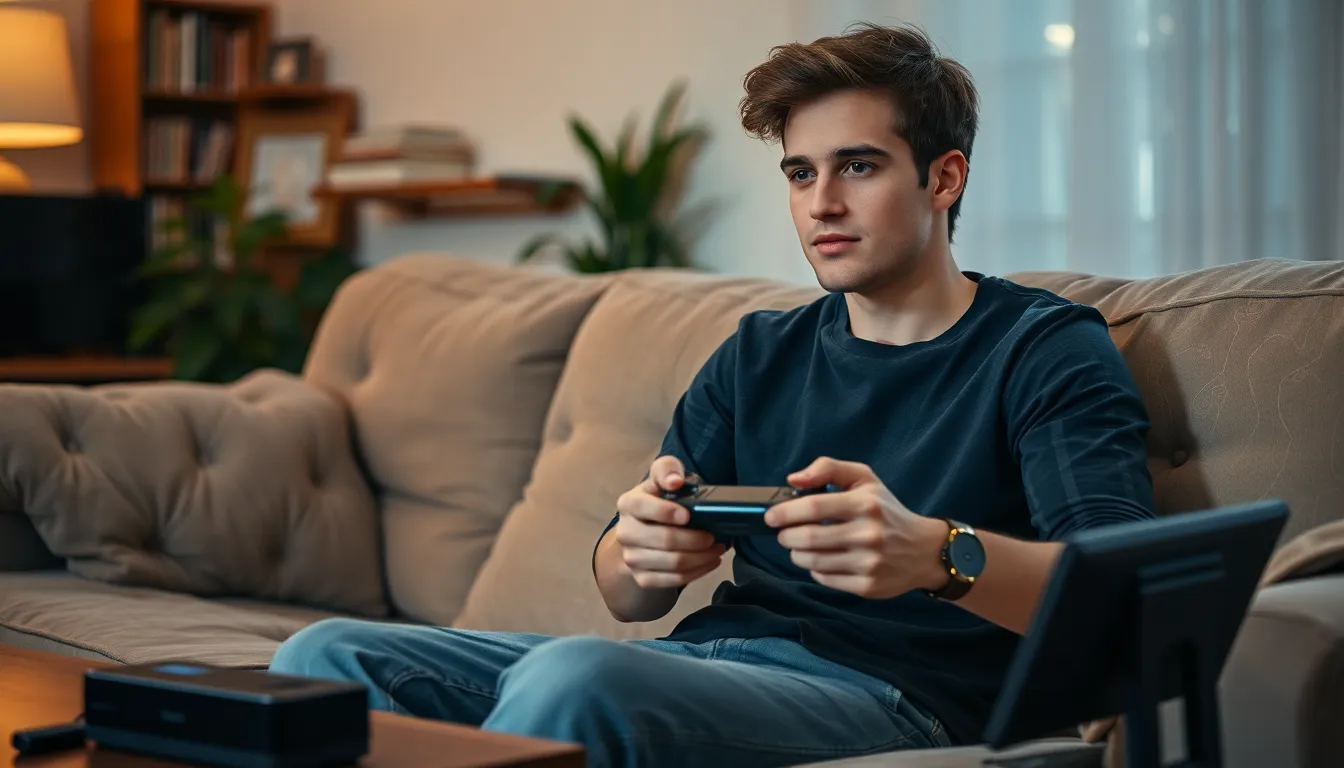Table of Contents
ToggleIn a world where adulting often feels like a never-ending series of responsibilities, video gaming offers a delightful escape. But how much gaming is too much? It’s a question that’s sparked debates among friends and family alike. While some claim that gaming is the ultimate stress reliever, others worry it might lead to a serious case of couch potato syndrome.
Picture this: a grown adult, snack in hand, glued to the screen as they conquer digital worlds. It’s both captivating and slightly concerning. Finding the balance between gaming for enjoyment and letting it take over life is crucial. So, how do adults navigate this pixelated playground without losing sight of reality? Let’s dive into the numbers and discover just how much gaming is the right amount for a healthy adult lifestyle.
Understanding Overdertoza in Video Gaming
Overdertoza in video gaming relates to excessive gaming that negatively impacts daily life. Adults often struggle with finding an appropriate gaming balance, which can lead to overdertoza.
Defining Overdertoza
Overdertoza refers to gaming habits that interfere with personal responsibilities and social interactions. Signs of overdertoza include neglecting work or relationships, all while immersing in gaming. Adults experiencing overdertoza may also show reduced physical activity, resulting in health complications. Establishing clear boundaries can help identify when gaming becomes excessive.
Factors Contributing to Overdertoza
Several factors contribute to overdertoza in video gaming. Many adults escape reality through gaming, seeking relief from stress and anxiety. Social connections within gaming communities can deepen the immersive experience, encouraging extended play. Game design elements, such as rewards and achievements, often foster habitual gaming behavior. Additionally, unstructured time or lack of alternative hobbies frequently leads to increased gaming duration.
Recommendations for Healthy Gaming

Maintaining a healthy gaming lifestyle involves understanding time commitment and balancing activities.
Recommended Gaming Time
Experts suggest limiting gaming to 1-2 hours per day for adults. Finding time during the week can create a consistent gaming routine while allowing breaks. Scheduled gaming sessions foster engagement without promoting overdertoza. It’s essential to pay attention to personal limits, listening to one’s body and mind for signs of fatigue. Quality often outweighs quantity, so focusing on enjoyable experiences enhances the benefits.
Balancing Gaming with Daily Activities
Integrating gaming with daily responsibilities promotes a healthier lifestyle. Prioritize regular physical activity, like walking or gym sessions, alongside gaming. Social interactions, whether virtual or in-person, provide necessary balance, reducing feelings of isolation. Designate specific times for gaming that do not interfere with work or family commitments. Incorporate tasks such as chores or projects before playing to maintain accountability, ensuring gaming remains a leisure activity instead of a primary focus.
Psychological Effects of Overdertoza
Excessive gaming, or overdertoza, can lead to significant psychological challenges. Adults may experience heightened levels of anxiety and depression due to prolonged screen time. Research shows that individuals engaged in long gaming sessions often exhibit increased stress and mood fluctuations. Individuals might rely on gaming as an escape mechanism, which can worsen underlying mental health conditions over time.
Social relationships can deteriorate as a result of overdertoza. Isolation often occurs when individuals prioritize gaming over face-to-face interactions. Friends and family may feel neglected, leading to strained relationships and a diminished support network. Adults may find it difficult to engage in social activities outside of gaming, creating a vicious cycle of withdrawal. Community connections diminish as individuals become more immersed in virtual worlds, making real-world interactions uncomfortable or challenging.
Addressing Overdertoza in Adults
Overdertoza impacts adults’ lives significantly. Recognizing its signs is crucial for maintaining a balanced lifestyle.
Recognizing the Signs
Signs of overdertoza often include neglecting responsibilities. Individuals may notice reduced physical activity and declining social interactions. Fatigue after extended gaming sessions becomes common, along with irritability when unable to play. Changes in mood and increased anxiety can arise from spending excessive time in front of screens. He or she may also find it challenging to engage in offline activities. Consulting with a friend or family member may help identify these behaviors.
Strategies to Mitigate Overdertoza
Implementing strategies can effectively mitigate overdertoza. Limiting gaming time to 1-2 hours daily promotes healthier habits. Establishing clear gaming schedules allows individuals to balance leisure and productivity. Taking regular breaks during gaming sessions helps maintain focus and reduces fatigue. Prioritizing physical activity integrates movement into daily routines. Engaging in social interactions outside of gaming encourages community connections. Setting personal goals can create a sense of achievement beyond the gaming world.
Finding the right balance in video gaming is crucial for adults. While gaming can be a fantastic outlet for stress relief and enjoyment, overdertoza can lead to significant negative impacts on daily life. By recognizing the signs of excessive gaming and implementing strategies to maintain a healthy lifestyle, individuals can enjoy their gaming experiences without compromising their responsibilities or well-being. Prioritizing physical activity, engaging in social interactions, and setting limits on gaming time can help ensure that gaming remains a positive and enriching part of life. Ultimately, it’s about creating a harmonious relationship with gaming that supports both mental health and personal fulfillment.




